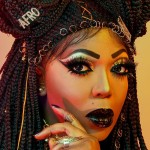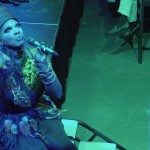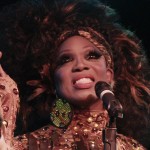 In celebration of LGBTQI+ Pride Month and Good Docs’ educational release & academic screening tour of the award-winning new film BEING BEBE, Fulbright Association is hosting the Fulbright Forum event – BEING BEBE: Cross-Cultural Exchange & the Advancement of LGBTQI+ Human Rights.
In celebration of LGBTQI+ Pride Month and Good Docs’ educational release & academic screening tour of the award-winning new film BEING BEBE, Fulbright Association is hosting the Fulbright Forum event – BEING BEBE: Cross-Cultural Exchange & the Advancement of LGBTQI+ Human Rights.
Held on June 13th at 12pm EDT, Fulbright Association welcomes iconic drag performer BeBe Zahara Benet, filmmakers, and activists including Rainbow Railroad’s Executive Director Kimahli Powell to discuss the film’s themes – challenging stereotypes, empowering diverse gender expression, celebrating creativity, family acceptance, faith, love, and LGBTQI+ human rights.
Though fans know BeBe as the iconic first winner of the worldwide phenomenon RuPaul’s Drag Race, the film opens audiences’ eyes to not only BeBe’s personal struggles, but also the challenges that LGBTQI+ and gender non-conforming individuals in BeBe’s home country of Cameroon (as millions elsewhere) still face today.
BEING BEBE Fulbright ties run deep – from BeBe’s father Dr. Collins Ngwa (an esteemed Professor of International Relations in Yaounde who appears throughout the film), to Producer Jonathan Goodman Levitt and Advisory Board Member Natasha Johnson, both Fulbrighters to the U.K. Fulbright GNY also hosted a reception with BeBe after the film’s NYC premiere to continue the conversation about cultural diversity & Black Queer Excellence that the film embodies.
The following Q&A offers a taste of what BeBe brings to BEING BEBE and will share at the upcoming Fulbright Forum:
As an immigrant to the United States from Cameroon, how do you feel both cultures have influenced your art, music, and persona as BeBe Zahara Benet?
I feel lucky to say that America is my chosen home, and while it comes with its own hardships or difficulties, it’s still a place that has accepted me. I had to come here to birth this BeBe Zahara Benet. I’m able to live here and develop my craft and live my craft and inspire people and be who I want to be. There’s just such a level of freedom being here. When I came here at first, it was like, okay, do I have to act like an American? Do I have to dress a certain way? Do I need to sing a certain way? Do I have to perform a certain way?
But I realized that it’s the opposite because people do embrace where I come from. They do embrace the fact that I am, you know, showcasing culture and bringing it into their lives. They love that about me. Culture plays a huge part in my artistry. That’s what makes BeBe “BEBE.” There’s something amazing that I feel like I’m gifting other people from where I come from – whether it’s through dance, music, food, fashion, whatever.
You know, we wish it could be different in terms of certain things, but we don’t hate where we come from. I think we come to this country because there is some level of freedom to be able to live and to be able to develop and be who we are. If Cameroon had even half of the opportunities that America gives us here, then most people who are even coming here would not be coming here.
It’s that part though – the wish that the celebration of my art form could be in Cameroon, you know, where my people can actually be part of this kind of celebration and artistry. There’s just that little sadness in that, you know, I’m not able to really be BeBe in Cameroon.
 In the new documentary, you look back at footage spanning the highs and lows of your 15+ years of your career – what was that experience like for you?
In the new documentary, you look back at footage spanning the highs and lows of your 15+ years of your career – what was that experience like for you?
It’s very wild to me. Like how time flies so fast, but it feels like yesterday. I mean – I was a little skinny back then – now I’m a grown woman! And what I love is now that I look back, many years later – with everything that’s going on now and with the conversations that are happening now – I think that it’s almost like divine timing. People need to see and hear these stories now, because it’s not always the tra-la-la and fra-la-la of it all. People need to see that, with perseverance and with struggle, there’s always that light at the end of the tunnel, you know?
And it doesn’t mean that it always ends up being perfect, but you just have to hang on to it and trust what that is. And I’m hoping that my story is what tells people that you [should] never give up. And I know it’s a pageant answer sometimes, cuz everybody says, “Oh, never give up” – but guess what? You can look at this movie and say, “Yes, never give up!” Do you know what I mean? Because you get to follow the journey of what that is. It’s not just a statement.
BeBe, your father Dr. Collins Ngwa was a Fulbright scholar – can you tell us a little bit about him?
Yes, my dad was an international scholar – a professor, and like a mentor to many people who went on to become diplomats, ambassadors, ministers. He traveled abroad a lot as a student and an educator and had SO many degrees (laughs). He was the pillar of our family. He was full of light. Full of love. Full of joy, you know. He always cracked jokes and loved to gather people together. He was a man that always was about unifying people. And I think I get a lot of that from him. Like we can all be different, but we can all come together and coexist together because of what our differences are – and that’s what makes this world beautiful, because we are all that different.
He was the kind of father who has no judgment on who you are, and accepts every layer of who you are. Even the times when Dad did not really know what drag was – the idea of just allowing me to be me, and just being supportive of the path in terms of my career and my artistry. And my dad always was that kind of a man who was so grounded and not going to compromise his integrity, but believed that with hard work and perseverance, you will be successful and create your own thing and create your own opportunities. He lives on, you know. He lives on in us, his work lives on.
Granted, he traveled a lot, he was very educated, he’d lived here in the US, but he still was a man of culture and tradition in a place where difference was not always tolerated. So just being so accepting, even when he didn’t understand, even when it was still a journey for him – it was something special, and I think something that his studies around the world probably helped open his mind to. I think that I am able to be who I am because my family accepted me to be who I am.
 As the very first winner of the international reality TV sensation RuPaul’s Drag Race, what has it been like to be a role model to so many LGBTQI+ and gender non-conforming individuals in Cameroon and around the world?
As the very first winner of the international reality TV sensation RuPaul’s Drag Race, what has it been like to be a role model to so many LGBTQI+ and gender non-conforming individuals in Cameroon and around the world?
I don’t know if I set out to be a role model. I know I set out to live my truth. I set out knowing that there was something that I had to bring into the world, whatever that is. And I always keep saying that our platforms are a privilege. But I also know it comes with a lot of responsibility, you know, and that’s why we have to be very careful.
People need to see more things that are positive, because you have people from Cameroon and Africa and all around the world, who are not able to live the way we are living – who look to us to seek some peace or to try to be inspired or try to say, you know, if BeBe can do it, then I can do it. You know? And when you get all these messages where people tell you how you have moved them and helped them, when it comes to suicide, or just personal stories where it took them watching me do A, B, C, D, E, F, G for them to change their mind about something about their life. And to me, it’s not a responsibility that I asked for, but it comes with it. So I’m just humbled, you know?
– Marshall Kudi Ngwa (aka BeBe Zahara Benet), as told to BEING BEBE Director/Producer Emily Branham. Some of BeBe’s answers have been edited for length.
Learn more about BEING BEBE, and how to bring the film to your school or library: https://gooddocs.net/products/being-bebe





